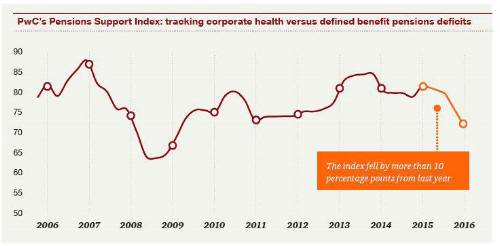PwC’s Pension Support Index tracks the relationship between the financial strength of the FTSE 350 companies and the size of DB pension scheme commitments, rating the overall level of employer support offered to these schemes. This year’s score of 69 out of a possible 100 is down from 82 the previous year, and is the lowest score since 2009.
The index shows the biggest pressure on company deficits is rising liabilities as result of the fall in long-term gilt yields. Schemes that hedged their interest rate risk were able to cope with falling yields whereas those who did not have seen deficit valuations go up.
The Pensions Regulator has highlighted this stress on DB pensions estimating 5% of schemes in this valuation cycle are at risk of, or already failing to, meet obligations.

Jonathon Land, head of PwC’s pensions credit advisory practice, said: “This year’s index score is the largest drop since the recession. The last time we saw a fall this big was because of company performance, this time it’s because of scheme size. If a combination of political uncertainty following the election and Brexit leads to another economic jolt to company performance, this would be a double-whammy for pension scheme support.
“If you have a strong covenant with an immature scheme you can afford to wait for rates to rise. For many, with either a weak covenant or a relatively mature scheme, our Pensions Support Index shows time is running out. These schemes need to focus on the strength of their employer, the ability to make increased contributions and the risks attached to their investment strategy.”
Managing risk
For schemes with a weak employer covenant and significant outgoings to cover member benefits, the risk of negative cash flows is increasing with the likelihood of some schemes being forced to sell assets to pay liabilities.
Sinead Leahy, pensions investment partner at PwC, said: “In this low yield environment, pension funds need to review their investment strategy. Having a focus on cash flow matching assets which have good returns can both help to reduce risk, by providing a better match for Scheme liabilities, and repair deficits."
Monetary policy
Since the EU referendum, the Bank of England, in an attempt to shore up the economy, cut its base rate to a historic low of 0.25%. With the US Federal Reserve however moving in the opposite direction raising its policy rate, UK-based companies will be wondering when the UK will follow suit.
Andrew Sentance, PwC’s senior economic adviser, said:“In some advanced economies, interest rates are already starting to increase, led by the US Federal Reserve. In the UK however, concerns over Brexit are likely to lead to the current low interest rate environment remaining lower for longer. This will continue to impact schemes in the short to medium term.”
|

